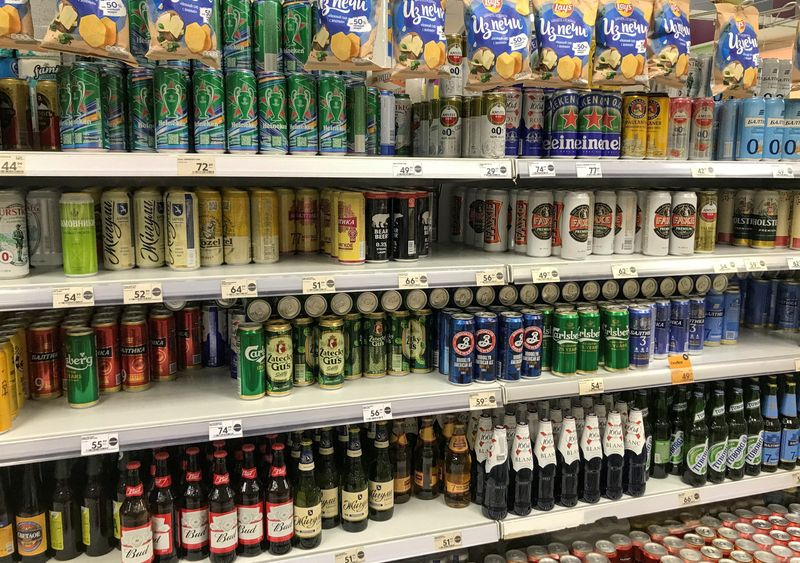Written by Alessandro Parodi, Alexander Marou
(Reuters) – The exodus of companies from Russia since the 2022 invasion of Ukraine has cost foreign companies more than $107 billion in writedowns and lost revenue, a Reuters analysis of company filings and statements shows. It was revealed.
The losses have increased by a third since the last tally in August last year, underscoring the scale of the economic toll on the business world from Russia's invasion and the sudden loss of Western expertise from the Russian economy. It highlighted that.
“As Western military aid stalls, Russian aggression continues, and Western sanctions regimes increase in granularity, companies still looking to exit Russia are likely to face further difficulties and face greater write-downs. and will have to accept losses,” said Ian Massey, head of corporate intelligence. EMEA, global risk consulting firm S-RM.
President Vladimir Putin, who just secured re-election in a landslide victory widely denounced as unfair and undemocratic in the West, is now facing pressure from the West through additional asset seizures and political pressure. Massey added that he has a new mission: to seek greater isolation.
The Russian government has steadily tightened its exit requirements, demanding at least a 50% discount on foreign asset sales, often accepting nominal fees of as little as 1 ruble.
So far this year, announced sales of assets owned by Shell, HSBC, Polymetal International and Yandex NV have totaled nearly $10 billion and come at discounts of up to 90%. Danone announced last week that it had received regulatory approval to dispose of Russian assets for a total loss of $1.3 billion.
Approximately 1,000 companies withdrew. Austrian brick maker Wienerberger has sold its Russian factory and exited the market, RBC daily reported on Thursday.
But hundreds of companies, including French retailers Ocean and Benetton, are still operating there or have ceased operations, according to an analysis by the Yale School of Management.
Russian retaliation
After the Russian invasion, Western countries froze approximately $300 billion of Russian banks' gold and foreign exchange reserves. Germany nationalized Gazprom's Germania plant and renamed it Zefe, and placed Rosneft's Shvet refinery under German trusteeship.
Russia has vowed to retaliate against the EU's proposal to redistribute billions of euros in interest earned on frozen assets, warning of catastrophic consequences and calling any attempt to seize capital or interest “a bandit.” ”.
Western banks are also concerned that the confiscation could lead to legal disputes.
“As long as the Kremlin continues to wage war, Russia has no Western assets or surrounded assets that can be considered safe,” Massey said.
Moscow already has temporary control over assets owned by several Western companies, including Fortum, Carlsberg, OMV and Uniper.
Russia's state-run RIA news agency has estimated that Western countries could lose at least $288 billion in assets and investments if Russia retaliates.
This is based on data showing that direct investments by the European Union, G7 countries, Australia and Switzerland into the Russian economy totaled $288 billion at the end of 2022.
According to the report, EU countries held $223.3 billion in assets, of which $98.3 billion was officially held by Cyprus, $50.1 billion by the Netherlands and $17.3 billion by Germany.
Reuters was unable to verify the data cited by the RIA.
However, Russia's hardline stance also damages Russia.
Sanctions expert Jeremy Zucker says a surprising number of his firm's clients across a wide range of industries have decided to leave Russia completely and are reluctant to return once hostilities have ended. He said it was highly likely.
As a result, meaningful technology could leave the country and Russia could be unable to support the production of certain high-tech products, said Zucker, director of the national security practice at US law firm Dechert.
“This certainly suggests a significant degree of damage to the economy,” he told Reuters.
major assets
A 2022 law would prevent investors from “unfriendly” countries that have imposed sanctions on Russia over its actions in Ukraine from selling stakes in major energy projects or banks without explicit presidential approval. is prohibited.
Meanwhile, many producers of household goods and consumer goods have refrained from leaving Russia completely, arguing that everyday Russians depend on their products.
Companies still operating in Russia include Mondelēz International PepsiCo, Auchan, Nestlé, Unilever, and Reckitt. Other players, including Intesa Sampaolo, have faced bureaucratic hurdles in trying to leave.
(1 dollar = 92.7000 rubles)
(1 dollar = 0.9217 euro)
(Reporting by Alessandro Parodi in Gdańsk and Alexander Murrow in London; Editing by Josephine Mason, David Evans and Miral Fahmy)


